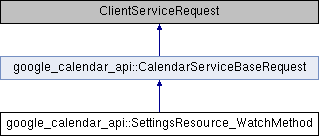#include <calendar_service.h>
Implements the watch method.
This class uses the Command Pattern. Construct an instance with the required parameters, then set any additional optional parameters by using the attribute setters. To invoke the method, call Execute.
One or more of these authorization scopes are required for this method: https://www.googleapis.com/auth/calendar https://www.googleapis.com/auth/calendar.readonly https://www.googleapis.com/auth/calendar.settings.readonly
◆ SettingsResource_WatchMethod()
| google_calendar_api::SettingsResource_WatchMethod::SettingsResource_WatchMethod |
( |
const CalendarService * |
_service_, |
|
|
client::AuthorizationCredential * |
_credential_, |
|
|
const Channel & |
_content_ |
|
) |
| |
The standard constructor takes all the required method parameters.
- Parameters
-
| [in] | <em>service</em> | The service instance to send to when executed. |
| [in] | <em>credential</em> | If not NULL, the credential to authorize with. In practice this is supplied by the user code that is creating the method instance. |
| [in] | <em>content</em> | The data object to watch. |
◆ ~SettingsResource_WatchMethod()
| google_calendar_api::SettingsResource_WatchMethod::~SettingsResource_WatchMethod |
( |
| ) |
|
|
virtual |
◆ AppendOptionalQueryParameters()
| util::Status google_calendar_api::SettingsResource_WatchMethod::AppendOptionalQueryParameters |
( |
string * |
target | ) |
|
|
virtual |
◆ AppendVariable()
| util::Status google_calendar_api::SettingsResource_WatchMethod::AppendVariable |
( |
const StringPiece & |
variable_name, |
|
|
const client::UriTemplateConfig & |
config, |
|
|
string * |
target |
|
) |
| |
|
virtual |
Appends variable value to the target string.
This is a helper function used to resolve templated variables in the URI.
- Parameters
-
| [in] | variable_name | The name of the templated variable. |
| [in] | config | A pass-through parameter used for lists and maps. |
| [in,out] | target | The string to append the value to. |
Reimplemented from google_calendar_api::CalendarServiceBaseRequest.
◆ clear_max_results()
| void google_calendar_api::SettingsResource_WatchMethod::clear_max_results |
( |
| ) |
|
|
inline |
Clears the 'maxResults' attribute so it is no longer set.
◆ clear_page_token()
| void google_calendar_api::SettingsResource_WatchMethod::clear_page_token |
( |
| ) |
|
|
inline |
Clears the 'pageToken' attribute so it is no longer set.
◆ clear_sync_token()
| void google_calendar_api::SettingsResource_WatchMethod::clear_sync_token |
( |
| ) |
|
|
inline |
Clears the 'syncToken' attribute so it is no longer set.
◆ ExecuteAndParseResponse()
| util::Status google_calendar_api::SettingsResource_WatchMethod::ExecuteAndParseResponse |
( |
Channel * |
data | ) |
|
|
inline |
Executes the method and parses the response into a data object on success.
- Parameters
-
| [out] | data | Loads from the response payload JSON data on success. |
- Returns
- Success if an HTTP 2xx response was received. Otherwise the status indicates the reason for failure. Finer detail may be available from the underlying http_request to distinguish the transport_status from the overal HTTP request status.
◆ get_max_results()
| int32 google_calendar_api::SettingsResource_WatchMethod::get_max_results |
( |
| ) |
const |
|
inline |
Gets the optional 'maxResults' attribute.
If the value is not set then the default value will be returned.
◆ get_page_token()
| const string& google_calendar_api::SettingsResource_WatchMethod::get_page_token |
( |
| ) |
const |
|
inline |
Gets the optional 'pageToken' attribute.
If the value is not set then the default value will be returned.
◆ get_sync_token()
| const string& google_calendar_api::SettingsResource_WatchMethod::get_sync_token |
( |
| ) |
const |
|
inline |
Gets the optional 'syncToken' attribute.
If the value is not set then the default value will be returned.
◆ mutable_pageToken()
| string* google_calendar_api::SettingsResource_WatchMethod::mutable_pageToken |
( |
| ) |
|
|
inline |
Gets a modifiable pointer to the optional pageToken' attribute.
- Returns
- The value can be set by dereferencing the pointer.
◆ mutable_syncToken()
| string* google_calendar_api::SettingsResource_WatchMethod::mutable_syncToken |
( |
| ) |
|
|
inline |
Gets a modifiable pointer to the optional syncToken' attribute.
- Returns
- The value can be set by dereferencing the pointer.
◆ set_max_results()
| void google_calendar_api::SettingsResource_WatchMethod::set_max_results |
( |
int32 |
value | ) |
|
|
inline |
Sets the 'maxResults' attribute.
- Parameters
-
| [in] | value | Maximum number of entries returned on one result page. By default the value is 100 entries. The page size can never be larger than 250 entries. Optional. |
◆ set_page_token()
| void google_calendar_api::SettingsResource_WatchMethod::set_page_token |
( |
const string & |
value | ) |
|
|
inline |
Sets the 'pageToken' attribute.
- Parameters
-
| [in] | value | Token specifying which result page to return. Optional. |
◆ set_sync_token()
| void google_calendar_api::SettingsResource_WatchMethod::set_sync_token |
( |
const string & |
value | ) |
|
|
inline |
Sets the 'syncToken' attribute.
- Parameters
-
| [in] | value | Token obtained from the nextSyncToken field returned on the last page of results from the previous list request. It makes the result of this list request contain only entries that have changed since then. If the syncToken expires, the server will respond with a 410 GONE response code and the client should clear its storage and perform a full synchronization without any syncToken. Learn more about incremental synchronization. Optional. The default is to return all entries. |
The documentation for this class was generated from the following files:

 Public Member Functions inherited from google_calendar_api::CalendarServiceBaseRequest
Public Member Functions inherited from google_calendar_api::CalendarServiceBaseRequest Protected Member Functions inherited from google_calendar_api::CalendarServiceBaseRequest
Protected Member Functions inherited from google_calendar_api::CalendarServiceBaseRequest